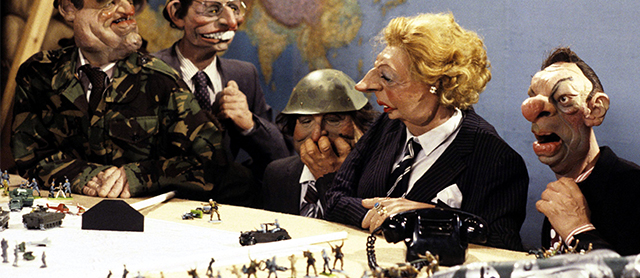From Horace to The Onion – a history of satire

Spitting Image (ITV/Rex/Shuttersock)
In Medieval Celtic society, a bard’s “satire” was believed to be so powerful that it could kill – or at least bring forth festering pustules. Through their verse these writers ensured the immortality of kings, lords and chieftains. But if an authority figure fell foul of a bard through dishonourable conduct, that power could be used against them in a glam dicenn – a satirical poem with dark magical properties, such as the raising of distinctly ignoble boils.
While today’s authority figures are unlikely to fear physical impairment from satirists, that core idea remains: to criticise the powerful by exposing them to ridicule, and at best compel them to either provoke or prevent change. Unlike the stark didacticism of moralisers, satirists engage audiences with humour.
Satirical works often place ideas or actions in ironic opposition, leading us to a conclusion via indirect means; ambiguity is the satirist’s key defence. Popular techniques include exaggeration, distortion, understatement, innuendo, allegory, oxymoron, parable, deadpan humour and zeugma.
The three main classifications of satire are taken from some of its earliest proponents: Ancient Romans Horace and Juvenal, and Ancient Greek writer Menippus. Horace’s light-hearted, urbane work playfully mocked universal human folly, inviting readers to critique themselves as well as society; Juvenal zealously attacked specific public officials and organisations, contemptuously branding them not just wrong but evil; and Menippus used extraordinary situations and digression to satirise attitudes or types, such as braggarts. Horatian satire gently instructs, Juvenalian punishes and demands change, and Menippean tests philosophical ideas.
Ancient Greek playwright Aristophanes was loved and feared in equal measure. His satirical targets included tragedian Euripides, philosopher Socrates, and – in particular – populist Athenian demagogue Cleon, who declared war on both Sparta and the nobility. Aristophanes’ plays suggest a tendency towards conservative politics, but given he entered his work into competition at prestigious drama festivals there may have been a tactical decision to reflect and humour the views of the judges and the audience, rather than express his own.
There are fewer surviving examples of satire from the European Middle Ages, but Al-Jahiz in the 9th century, and 10th-century sparring poets As-Salami and Abu Dulaf, certainly popularised it in Arabic writing. The late 14th century brought Chaucer’s seminal Canterbury Tales, which skewered chivalric tradition and the increasingly corrupt Catholic Church. Chaucer drew a clear distinction between heavenly ideals and institutions that fell short of them, destroying the mystique of Christianity’s earthly representatives. Radical for its time, his assessment is neatly ensconced in a witty, bawdy romp. After chuckling in recognition at Chaucer’s observations of English characters and behaviours, readers may have been more receptive to his serious points.
The clergy’s corruption and superstitious excesses also came under fire in Erasmus’s 1509 essay In Praise of Folly, which evokes the satires of Lucian in its wry, scoffing scepticism. Again, the use of humour shields the writer while entering into a treacherous religious debate – a protection denied to the work’s dedicatee, Thomas More. In France, Renaissance humanist Rabelais’ risqué satirical novels were repeatedly condemned by both the Sorbonne and the Catholic Church, suggesting they were perceived as a significant threat, and Molière brilliantly dissected social convention in The Misanthrope. Cervantes’s enduring 1605 work Don Quixote is an overt spoof of chivalric romance and a slyer commentary on the rules of living.
The rational Age of Enlightenment birthed some of the great satirists, chief among them essayist, novelist and pamphleteer Jonathan Swift. His 1729 Juvenalian work A Modest Proposal mocks British lack of empathy towards Ireland’s impoverished. Illogical, quick-fix solutions become a hyperbolic – yet seemingly straight-faced – proposal that the poor sell their children as food to the wealthy. The apparently diligent narrator’s increasingly absurd detachment from human suffering lures the reader into sympathy for the Irish and anger towards their oppressors, rather than haranguing us into submission.
Swift’s Gulliver’s Travels uses the framework of a traveller’s tale to satirise everything from the Royal Society’s experimental science and philosophy to English governance and entrenched religious animosity. The Emperor of Lilliput choosing his ministers on the basis of who can walk a tightrope is a reference to George I’s dubious rationale for appointments, one of many examples of Swift making a social custom seem alien and illogical through allegory.
Swift was a keen member of the Scriblerus Club, a London-based group of writers dedicated to satire. Other Scriblerus leading lights included John Arbuthnot, Thomas Parnell and Alexander Pope, whose mock-heroic epic poem The Dunciad takes aim at stupidity or “Dulness”, from hack scholars and woeful poets to empty pretension, lumbering academic pedantry, vapid patrons and the decline of imagination.
The Dunciad illustrates that satirists aren’t just dedicated to skewering the powerful; Pope is equally concerned with the public slide towards mediocrity. The question of whether satire should only “punch up” has become particularly potent in the wake of the Charlie Hebdo shooting. Doonesbury cartoonist Gary Trudeau, though condemning the violence and arguing for the protection of free speech, expressed discomfort about the magazine’s work: “Ridiculing the non-privileged is almost never funny – it’s just mean. By punching downward, by attacking a powerless, disenfranchised minority with crude, vulgar drawings closer to graffiti than cartoons, Charlie wandered into the realm of hate speech.”*
Do satirists have a responsibility, when selecting their targets, to redress a balance or champion a beleaguered cause? Is the satirist’s first duty to entertain, to make us think, or to bring about consequential reform? Trudeau has fulfilled the latter: after his comic strip satirised a Florida county with a racist policy requiring minorities to carry a passcard, the law was repealed with an act that became known as the Doonesbury Act.
The strong social purpose of Charles Dickens’ work places his form of satire in that category, from uncompromising utilitarianism and the faulty equation of wealth with morality in Hard Times to the absurdities of the legal profession. The neverending inheritance suit in Bleak House has become so complicated that “no man alive knows what it means”, and Dickens’ depiction of a law system rife with incompetence and abuse – deeply comical, were it not for its destruction of people’s lives – precipitated major judicial reform.
In the 20th century, George Orwell’s savage satire in Animal Farm and Nineteen Eighty-Four warned of the consequences of sweeping social changes, from political totalitarianism to the surveillance state. Joseph Heller’s Catch-22, in which US airman Captain Yossarian attempts to evade seemingly suicidal missions during the Second World War, uses an inspired paradox to show the insanity of combat and wartime bureaucracy. In the 1960s, the ridiculing of authority figures in Beyond the Fringe encapsulated the subversive voice of the post-war generation.
On screen, Kubrick’s Dr Strangelove satirises the Cold War theory of mutually assured destruction, and Charlie Chaplin’s The Great Dictator took aim at fascism, at a time when the United States was still formally at peace with Nazi Germany. Spitting Image caricatured prominent politicians through merciless puppetry, while Brass Eye and The Day Today spoofed media methods, formats and guidelines. The great American singer-songwriter Tom Lehrer contributed gems to That Was The Week That Was, from race relations commentary (“National Brotherhood Week”) to a critique of American hawkishness (“Send the Marines”). Lehrer later called satire obsolete “when they awarded Henry Kissinger the Nobel Peace Prize”.
Has satire in fact become a less vital force in this age of quick-hit online petitions and cosy panel shows? Dramatists might beg to differ, with recent entrants including Richard Bean’s Great Britain, a swift National Theatre response to the phone hacking scandal; Boris: World King and Corbyn the Musical; and a Chichester Festival Theatre revival of Brecht’s The Resistible Rise of Arturo Ui, revised by one of tonight’s writers the political satirist Alistair Beaton, whose next full length is called Fracked! Or: Please Don’t Mention the F-Word.
While popular websites like The Onion may be more reflective than provocative, the internet does also provide a vital outlet for nations without a viable political opposition, with Russian dissidents frequently taking to Twitter and YouTube. Before we grow too smug, it should be noted UK comedy shows aren’t allowed to use footage of Parliamentary debates, a convention recently challenged by Charlie Brooker. Even if our satirists are no longer believed to wield dark magic, it seems they still have the power to disturb the status quo.
*Atlantic Magazine essay “The Abuse of Satire” 2015
Marianka Swain is a freelance arts journalist and theatre critic. www.mkmswain.com
ALSO: READ SATIRICAL PLAYS BY ALISTAIR BEATON, STELLA FEEHILY AND DAVID HARE

 Search
Search
